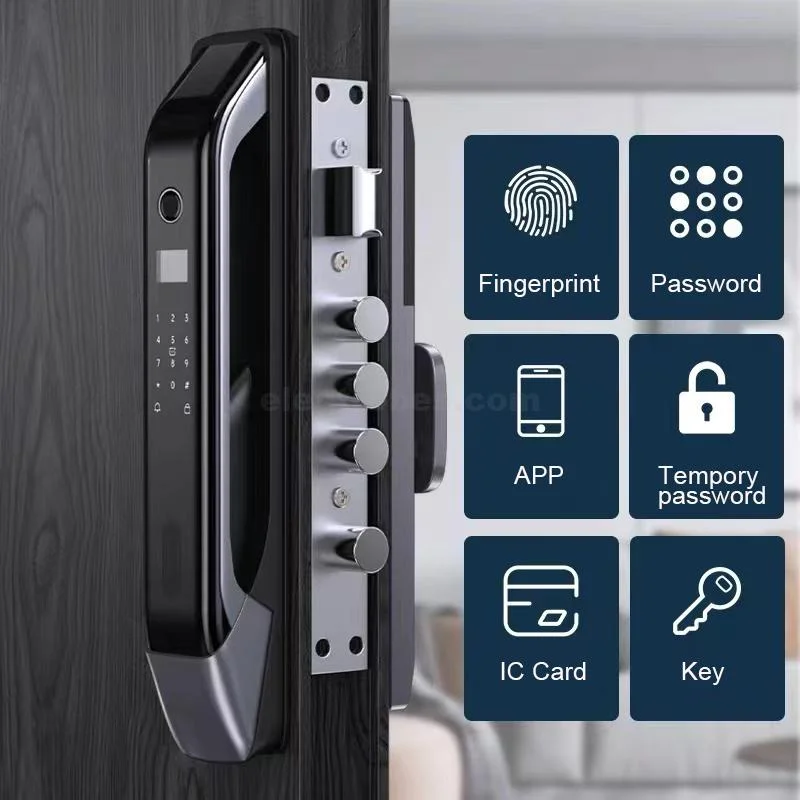The Ultimate Guide to Fingerprint Door Locks: Smart Security for Modern Homes

fingerprint door lock In today’s world, home security is no longer just about a solid door and a heavy-duty lock. With technology advancing rapidly, fingerprint door locks have become one of the most reliable and convenient security solutions for homes and businesses alike. These high-tech devices provide keyless entry using biometric data, offering enhanced security and an added touch of sophistication to your property. In this guide, we’ll dive deep into what fingerprint door locks are, how they work, their benefits, and why you might want to consider one for your home or office.
What is a Fingerprint Door Lock?

A fingerprint door lock is an electronic security system that uses biometric authentication to grant or deny access. Instead of using traditional keys or passcodes, it identifies a person by scanning and verifying their fingerprint. Since fingerprints are unique to every individual, this method ensures a high level of security and minimizes the risk of unauthorized entry.
Most fingerprint door locks are designed to be sleek and compact, blending seamlessly with modern home aesthetics. They often come equipped with additional features like PIN code access, RFID card support, and smartphone connectivity for remote access. Whether installed on your front door, office, or even cabinets, these locks offer a tech-savvy way to secure spaces without the hassle of carrying physical keys.
The concept of biometric locks isn’t new, but it has significantly evolved over the past few years. Earlier, these systems were limited to high-security corporate buildings and government facilities. Today, due to affordable technology and increased consumer awareness, fingerprint locks are widely available for residential use as well.
How Does a Fingerprint Door Lock Work?
The functionality behind a fingerprint door lock might seem complex, but the core process is relatively straightforward. These locks rely on a biometric scanner that captures the fingerprint image and converts it into digital data. The data is then compared to the saved fingerprint templates stored within the lock’s memory.
When a registered fingerprint is scanned, the lock quickly verifies it against its database. If it matches, the door unlocks instantly. If not, access is denied. This entire verification process takes less than a second, making it faster than fumbling for keys or remembering complicated passcodes.
Fingerprint locks usually use either optical, capacitive, or ultrasonic sensors. Optical sensors capture a visual image of your fingerprint, capacitive sensors detect the ridges and valleys on your skin through electrical currents, and ultrasonic sensors use sound waves to capture the fingerprint pattern. Each method has its pros and cons, but capacitive and ultrasonic sensors tend to be more reliable and secure due to their ability to detect deeper fingerprint details.
Advantages of Using Fingerprint Door Locks
One of the biggest advantages of fingerprint door locks is the convenience they offer. Forget the days of losing keys or forgetting your PIN code. Your fingerprint is always with you, ensuring effortless entry whenever you need it. This is particularly useful for families with children or elderly members who might struggle with traditional locks.
Security is another major benefit. Unlike regular keys that can be stolen or duplicated, your fingerprint is unique and nearly impossible to replicate. Many of these locks also feature anti-tampering systems, alarms, and auto-lock functions, providing an additional layer of protection.
Fingerprint door locks also offer multi-access methods. In case your fingerprint scanner fails (due to dirt, injury, or technical issues), most devices allow alternative access through PIN codes, RFID cards, or even smartphone apps. This flexibility ensures you’re never locked out of your own home.
Things to Consider Before Buying a Fingerprint Door Lock
While fingerprint door locks are highly secure and convenient, it’s essential to consider a few factors before making a purchase. First, think about the lock’s compatibility with your existing door. Some fingerprint locks are designed specifically for wooden or metal doors and might not fit all door types without modifications.
Another consideration is battery life. Most biometric locks run on batteries, and while they typically last several months, it’s crucial to have a clear understanding of how often you’ll need to replace or recharge them. Many modern locks come with low-battery indicators and emergency power ports to prevent accidental lockouts.
Finally, review the lock’s storage capacity. If you have a large family or plan to grant access to multiple people, opt for a model that can store a higher number of fingerprints. Some models can store as few as 20, while others handle up to 200, making them suitable for small offices and rental properties.
Popular Features Found in Modern Fingerprint Door Locks
Today’s fingerprint door locks offer a range of features that go beyond just fingerprint access. Many of them are integrated with smart home systems, allowing you to lock and unlock doors remotely through mobile apps. You can monitor who enters and exits your home and even grant temporary access to guests or service providers.
Anti-peep technology is another useful feature where you can enter random numbers before or after your actual PIN code, preventing others from guessing your code by watching you. This adds an extra layer of security, especially for frequently visited locations like offices and apartments.
Some advanced models come with built-in cameras and two-way audio systems. This means you can see and communicate with the person at your door in real-time via your smartphone. It’s a fantastic option for those concerned about home security and package theft.
Are Fingerprint Door Locks Safe and Reliable?
Many people wonder if fingerprint door locks are genuinely reliable, especially in emergency situations. The short answer is — yes. These locks are designed with multiple fail-safes to ensure constant security. If the biometric scanner fails, you can usually rely on a backup method like a PIN code, physical key, or a smartphone app.
Additionally, most modern locks are weather-resistant and built to withstand environmental challenges like dust, rain, and extreme temperatures. Capacitive and ultrasonic sensors tend to be more reliable in detecting genuine fingerprints, even when your fingers are dirty or wet.
It’s also worth noting that reputable brands regularly update their devices’ firmware to fix vulnerabilities and enhance performance. As with any security device, choosing a high-quality lock from a trusted manufacturer is key to ensuring long-term reliability and peace of mind.
Ideal Applications for Fingerprint Door Locks
Fingerprint door locks aren’t just limited to front doors. They’re highly versatile and can be installed in a variety of settings. Homeowners commonly use them for entry doors, bedroom doors, and even secure closets or safes. They’re also perfect for rental properties, eliminating the hassle of exchanging keys between tenants.
In commercial settings, fingerprint locks are used for office entrances, server rooms, file cabinets, and restricted areas. They help monitor employee access and improve overall building security. Additionally, educational institutions and hospitals often use them to control access to sensitive areas like laboratories and medical storage rooms.
For travelers or people who frequently rent out properties on platforms like Airbnb, these locks are a game-changer. Temporary access can be granted or revoked remotely, offering both hosts and guests a secure and convenient experience.
Conclusion: Is a Fingerprint Door Lock Worth It?
In summary, fingerprint door locks offer a modern, secure, and hassle-free way to protect your home or business. They provide the perfect combination of convenience and cutting-edge technology, reducing the need for physical keys while enhancing overall security.
If you’re someone who values smart home upgrades or simply wants a reliable and stylish way to secure your space, investing in a fingerprint door lock is a smart move. Just be sure to choose a high-quality model, consider the features you need, and ensure it’s compatible with your door.
As technology continues to evolve, fingerprint locks are likely to become a standard security feature in homes and businesses worldwide. So, why not stay ahead of the curve and upgrade your entryway today?



